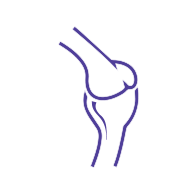- Private & confidential service
- Genuine medication
- All-inclusive service - No hidden fees
- Next day delivery
- HRT
HRT: start your consultation
- 1. Answer the online medical questions
- This helps our doctors to decide which treatment is safe for you.
- 2. Select your treatment
- You will see a list of recommended treatments. You can select the one you prefer.
- 3. Checkout and delivery
- Once you’ve completed the checkout, our doctors will review your answers. If all is safe, you will receive your treatment tomorrow.
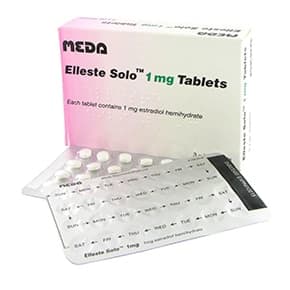
- Available as a 1mg or 2mg dose
- An oestrogen-only HRT
- Alleviates menopausal symptoms
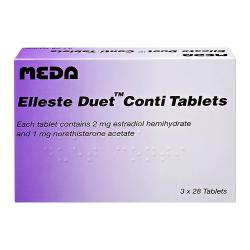
- Combination HRT
- Easy-to-take tablets
- Contains oestrogen & progesterone
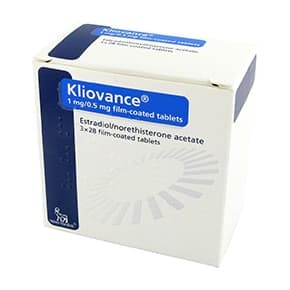
- Tablet form of HRT
- Reduces menopause symptoms
- Long-term treatment
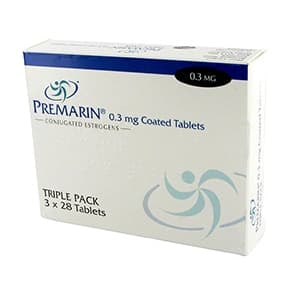
- Uses conjugated oestrogen
- Alleviates menopausal symptoms
- Easy to take tablets
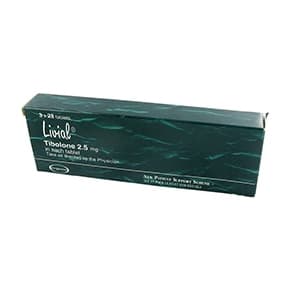
- HRT treatment without oestrogen
- Alleviates menopause symptoms
- Easy to take tablets
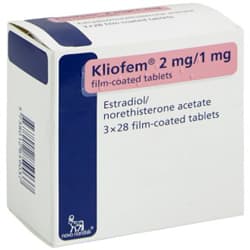
- Reduces menopausal symptoms
- Contains oestrogen and progestrone
- Taken on a daily basis
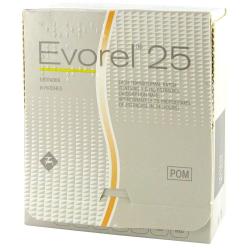
- Suitable after hysterectomy surgery
- Alleviates menopausal symptoms
- Easy to use patches
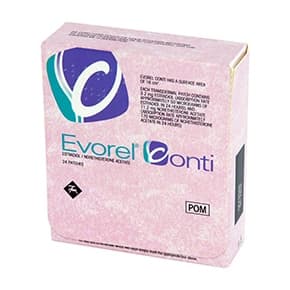
- Menopausal patch
- Absorbed through bloodstream
- Alleviates symptoms
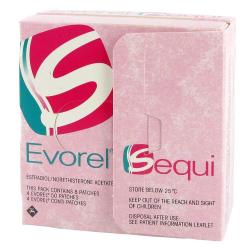
- 2 HRT patches
- Reduce menopausal symptoms
- Easy to use treatment
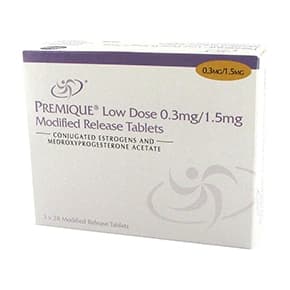
- Replenishes oestrogen loss
- Reduces menopausal symptoms
- Tolerable HRT tablets
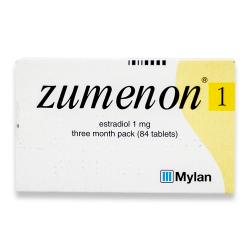
- Daily tablet
- Oestrogen-only treatment
- Alleviates menopausal symptoms
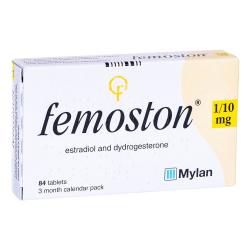
- Daily tablet
- Contains oestrogen & progesterone
- Alleviates menopausal symptoms
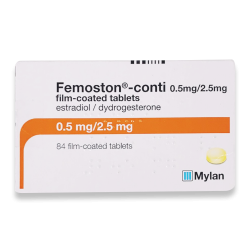
- Daily tablet
- Alleviates menopausal symptoms
- Contains oestrogen & progesterone
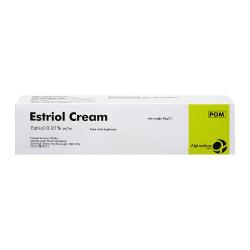
- Vaginal HRT cream
- Relieves vaginal dryness
- Applicator allows for easy use
HRT
Hormone Replacement Therapy (HRT) can alleviate symptoms of menopause including hot flushes, sweats, headaches and mood changes. For more information on the treatment options available, as well as other techniques to help you combat menopause, please read this comprehensive guide.
If you are already on hormone replacement therapy and wish to purchase treatment, you can do so below. Your prescription will then be sent to our pharmacy and dispateched with free next-day delivery. Alternatively, you can read more about HRT below.
Topics
What is HRT?
Hormone replacement therapy (HRT) is recommended for women who require relief from the symptoms of menopause at any age. However, it can also be used for osteoporosis prevention, women with perimenopause symptoms and women with surgical menopause. You can begin to take HRT as soon as you begin the menopause and wish to relieve symptoms.
Reasons for taking HRT include:
- Hot flushes
- Vaginal dryness
- Bladder leaks
- Recurring urinary tract infections (UTIs)
- Lack of libido and sex drive
- To improve bone health
- To protect against osteoporosis
- Reduce the risk of bowel cancer
What is the menopause?
The menopause means that the female hormones adjust causing an egg to stop being produced every 4 weeks. this tends to happen around the mid-50s, but it can begin earlier. If you smoke, there's a chance you will experience the menopause later.

The plus side is that you won't experience any more periods (and the cramping and pain associated with them) however, in their place, is a number of symptoms appear for an average of 4 years.
Despite popular belief, menopause isn't always a bad experience for all women - in fact, there are women that don't find the symptoms related to menopause bothersome at all - but for most, you can take HRT to alleviate them. HRT replaces the female hormones your body has lost to maintain a balance, allowing you to function without experiencing any emotional or physical changes.
How does HRT work?
The main purpose of HRT is to help replenish oestrogen levels, although some hormone replacement therapy may also contain progesterone, which can help endometrial health.
Oestrogen and Progesterone in HRT
Oestrogen is responsible for maintaining many functions in the female body. It is also responsible for many secondary female characteristics. When oestrogen levels start fall, it can cause a woman to experience a number of symptoms mentioned above.
HRT treatment is intended to reduce the severity of many of these symptoms and to prevent osteoporosis. A drop in hormones can also lead to a drop in bone mass, which can make women more vulnerable to conditions such as osteoporosis. All HRT medications contain oestrogen, or ingredients that act in a similar way once inside the body.
Whilst the lack of progesterone doesn't cause the majority of menopause symptoms, it is very important for womb health and it has been proven that a drop in the hormone can increase a woman's risk of developing endometrial cancer. This is why artificial progesterone, also known as progestogen, may be recommended as part of HRT treatment or form part of the ingredient in the medication used.
How long will I use HRT for?
Most women take HRT for two to five years, until the symptoms of menopause pass. It's not recommended to take it for longer than five years. It's also advised that when you're ready to finish HRT, you gradually decrease your dosage rather than stop abruptly.
How long you'll need to use HRT medications for will depend on your condition and your doctor. If you are at low risk of complications, you may be able to use some medicines for up to ten years, although generally HRT will be stopped as soon as possible.
Can I get pregnant when taking HRT?
Yes, you can still get pregnant whilst taking HRT. It is not a contraceptive method and even though your periods may have stopped it is still recommended that you use contraception for two years following your last period, especially if you're under the age of 50.
Can I take HRT if I've had a hysterectomy?
Yes, there are still benefits to taking HRT if you've had a hysterectomy. If you've had a full hysterectomy an oestrogen-only HRT will be more suitable, as without a womb there are no benefits to taking progesterone. If you've had a partial hysterectomy, the standard combined HRT medications are still the right choice, as you may have remaining womb lining.
When completing a consultation, be sure to list all relevant medical information and our doctor can advise the best HRT.
What are the potential risks of HRT?
Just like any treatment, HRT medicines have their risks, however medication involving the endocrine system are always monitored more carefully because they can influence a number of functions in your body. HRT is prescribed with some amount of care because of the fact that it replaces the function of oestrogen, an incredibly important hormone in the female body, especially at an age where older women are naturally more vulnerable to certain conditions such as stroke or coronary heart disease.
With short-term use of up to 10 years, it is proven to have little affect and whilst there are risks, you will never be prescribed HRT if it is not suitable for you. To make sure that you are safe while using HRT, your doctor will require you to come in for routine checks during your treatment and will prescribe the lowest dose required for the least amount of time, however this can still be as long as 10 years without having a negative impact.
Long term HRT can increase the risk of ovarian cancer, breast cancer, endometrial cancer and thromboembolism, which is why you'd normally not be prescribed HRT if you have a history of blood clotting conditions or oestrogen-sensitive cancer. To reduce the risk of endometrial cancer, it's standard to prescribe progesterone alongside oestrogen replacement treatments.
Will I gain weight if I take HRT?
There is no evidence to suggest that women put on weight because of HRT. Many women can tend to put on weight naturally during menopause, regardless or HRT. Sticking to a healthy eating plan and getting regular exercise can help avoid this unwanted weight gain.
What are the symptoms of the menopause?
All women will experience the menopause; however not all with have the usual symptoms that accompany it, or experience all of them on the list. The majority of women will have a few signs, and these usually start a couple of months in advance, otherwise known as the perimenopause. These will then continue for up to four years on average, however the NHS have stated that 1 in 10 women will have menopausal symptoms for up to 12 years.
- Change to your period
- Hot flushes
- Night sweats
- Loss of sex drive
- Vaginal itching/dryness
- Discomfort during sex
- Loss of bone density (Oesteoporosis)
- Mood swings
- Anxiety
- Heart palpitations
- Painful joints
- Recurrent urinary tract infections (UTIs)
In terms of a change to your periods, this could be lighter or heavier flows, a difference in frequency or any change in what is usually a normal pattern. Eventually, you all find that your periods will stop altogether.
The Relationship between menopause and osteoporosis
Osteoporosis is a disease that weakens the bones, increasing your risk of sudden fractures. There have been a number of studies which have shown a direct link between menopause and osteoporosis. This is due to the lack of oestrogen during the menopause. Symptoms of osteoporosis will usually not be detectable until the condition becomes so severe that even the slightest of bumps will cause a fracture.
What are the benefits of treating the menopause?
 Relief from menopausal symptoms
Relief from menopausal symptomsreduced effect of hot flushes, night sweats, vaginal dryness and itching associated with menopausal oestrogen deficiency.
 Can treat osteoporosis prophylaxis
Can treat osteoporosis prophylaxisas oestrogen levels are kept at a higher level, thereby avoiding significant loss of bone density.
How do I take HRT?
You can take HRT in a tablet form, via a patch, via an implant, or you can use an oestrogen gel. If your symptoms are related to vaginal dryness only you can also use local HRT, such as vaginal creams, vaginal rings and pessaries placed in the vagina.
Who can take HRT?
HRT is not recommended for women who:
- Are pregnant
- Have had, or are at high risk of having, breast cancer, ovarian cancer or womb cancer
- Have had, or are at high risk of, blood clots
- Have a history of stroke or heart disease
- Have high blood pressure that has been untreated
- Have liver disease or impaired liver function
What are some menopause management methods?
Treating the menopause will depend on the symptoms you are looking to treat. For example, some women may find the worse symptom by far is vaginal dryness, in which case lubrication provides relief, whilst others find that HRT treatment the most effective as it targets a wide array of discomfort. Whatever your scenario, you will find the best treatment to make the menopause pass with ease.
Hormone Replacement Therapy (HRT)
There are a number of different types of treatments used for HRT that all aim to improve oestrogen levels. Some contain conjugated oestrogens, tibolone or estradiol only, while others have some conjugated oestrogen and estradiol combined with artificial progesterone (known as oestrogen-only HRT and combined HRT respectively).
There are a number of choices available and a consultation will recommend a treatment based on their patient's individual needs. For example, if you are experiencing perimenopause, or you are still menstruating, your doctor isn't likely to recommend treatments containing tibolone, which is a anabolic steroid treatment that has the same effects on the body as testosterone, progesterone and oestrogen.
Women who have had their uterus removed, will normally only require a treatment containing conjugated oestrogens or estradiol, while women who are still menstruating or have not had a hysterectomy may be recommended these treatments in combination with progesterone.
HRT can treat a number of symptoms effectively including hot flushes, night sweats, headaches, vaginal bleeding and breast tenderness.
Lifestyle changes
Some alterations can be made to your day-to-day life that can make a huge difference to your standard of living, especially during the start when you're getting used to the modifications.
For night sweats and hot flushes
- Wearing light cotton clothing
- Keeping the temperature cool and rooms aired out
- Taking a cool shower
- Having a cool drink or sucking some ice
- Using a fan
- Avoiding spicy foods
- Limiting alcohol and caffeine
For a low libido
- Lubrication
- Additional foreplay
- Counselling
- Relationship openness
Vaginal dryness
- Vaginal moisturisers
- Lubricants
Mood changes
- Regularly exercising
- Meditation
- Yoga or Pilates
- Cognitive behavioural therapy (CBT)
- Counselling
- Family and friend support
Weak bones (osteoporosis)
- Regular exercise
- Healthy diet
- Quit smoking
- Vitamin supplements
All of these self-help tips can be used in conjunction with hormone replacement therapy (HRT).
What HRT options are available?
HRT is available as creams, patches, tablets or implant. Creams are often applied directly to the vagina, whereas tablets can be taken orally or inserted into the vagina, depending on the treatment. Patches simply need to be applied to the skin and replaced when required, whereas oestrogen implants are a more long-term method that releases oestrogen into the bloodstream via a pellet under the skin.
Below are the list of HRT tablets, patches and creams available at HealthExpress.
Tablets
Patches
Creams
The above HRT treatments are available online from HealthExpress to patients who are already using these medications. Complete our online consultation and one of our UK registered doctors will assess your suitability to use these treatments and notify you when you can complete your order. The only payment is for the medication. Consultation, prescription, dispatch and delivery is all-inclusive.
medical form
medication
prescription
from pharmacy



